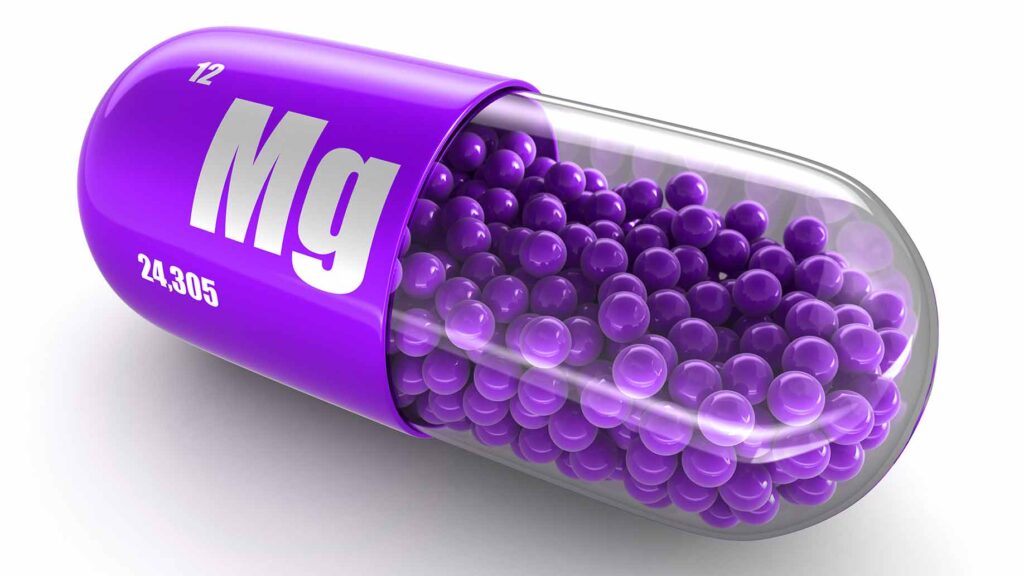Magnesium is the second most common element in the cells of the body, hundreds of biochemical reactions in the human body occur with the participation of magnesium.
Functions of magnesium
The main role of magnesium in the human body is to regulate enzymes that send chemical signals throughout the body.
It is necessary for the normal functioning of ATP molecules, which are a source of energy in the human body.
Magnesium is involved in the conversion of sugar and fat into energy, in the construction of DNA, in the contraction of muscle fibers, in the construction of new cells, in the absorption of minerals, as well as in the regulation of cholesterol levels.
The important role of magnesium determines the need for it for the normal functioning of all organs, bones and muscles in the human body, and the level of magnesium affects many aspects of health.
One of the most important functions of magnesium is its effect on muscle contractions. Magnesium is responsible for the relaxation of muscle fibers after their contraction. Thanks to this, you can make certain movements. Magnesium to prevent seizures caused by prolonged contraction of the muscles. Without magnesium to nourish your muscles, you feel weak and lethargic after physical activities such as climbing stairs.
The bones of the body are constantly updated. Magnesium not only helps regulate bone homeostasis, but also ensures proper absorption of vitamin D and calcium, which are essential for bone health.
Magnesium and depression
Due to the fact that magnesium is involved in the body’s chemical reactions, it also has an effect on the brain and neurotransmitters that affect our mood. In this way, magnesium can help improve your mental state.
According to a 2010 study, depressive conditions that cannot be treated with traditional medications can be improved with magnesium. Magnesium appears to be useful for preventing or treating depression because of its role in the synthesis of hormones and neurotransmitters. It provides the brain with the necessary amount of dopamine and other satisfaction-inducing chemicals to counteract depression.
Depression is so strongly associated with magnesium deficiency that some mental health experts have theorized that depression has become more common due to insufficient consumption of whole grains rich in magnesium.
Magnesium deficiency also causes other diseases, such as insomnia and anxiety neuroses. Magnesium helps calm the brain by blocking excessive activation of NMDA receptors. The constant activation of these receptors causes neuronal wear and tear, and it can even lead to cell death. The most important protective role of magnesium in the brain is that the brain is able to rest, relax, and process information.
Magnesium also affects mental disorders because it plays an important role in the production of hormones. Certain stress hormones, such as cortisol and epinephrine, are produced when the adrenal glands are activated. Magnesium helps to suppress and slow down the activation of the adrenal glands, protecting the body from an excess of these hormones, which increase blood pressure, anxiety and stress.
Magnesium deficiency
As we can see, magnesium is a very important mineral, but its role in biosynthesis is often overlooked. Unfortunately, a 2014 study published in the International Journal of Laboratory Medicine found that 2.5 – 15% of the population is deficient in magnesium.
This condition, known as hypomagnesemia, is quite common because processed foods, which make up the bulk of many people’s diets, do not contain magnesium.
At first, the signs of a moderate magnesium deficiency are subtle, but over time, hypomagnesemia causes serious problems. People with a small magnesium deficiency feel tired, weak, irritated, and nauseous.
If insufficient intake is replaced by an almost complete lack of magnesium intake, then symptoms such as severe muscle contractions, convulsions, arrhythmia, personality rearrangement and numbness appear. These signs of a dangerous magnesium deficiency can be life-threatening, but even a less serious deficiency can cause health problems.
You may have a magnesium deficiency if you notice the following symptoms:
Regular muscle cramps and spasms
Newly identified cardiovascular diseases
Difficulty falling asleep or having trouble sleeping
Slight trembling in the hands and feet
Difficulty remembering
Consistently high blood pressure
Excessive anxiety or depression
Diagnosed with type 2 diabetes mellitus
Deficiency of other minerals
Feeling weak during daily physical activity
Inability to concentrate
To get rid of these symptoms, you need to make sure that your body gets enough magnesium from food or supplements. The daily need for magnesium increases with age, because the body is less efficient at absorbing magnesium as it ages. Although men generally need more magnesium than women, the need for pregnant women is also high.
Men under the age of 30 need about 400 mg per day, but with age the need increases to 420 milligrams. Women under 30 usually need about 310 milligrams a day, and if they are pregnant, the need is 360 milligrams a day.
Sources of magnesium
Magnesium can be found in a variety of plant foods because it is an important element of chlorophyll that is involved in the process of photosynthesis. Green leafy vegetables, such as kale, spinach, and kale, are high in magnesium, and magnesium is also found in whole grains, nuts, and legumes.
There are also many tasteless liquid magnesium supplements that can be added to drinks and smoothies to boost your body’s magnesium levels without changing your diet.
General recommendations
Magnesium is an important mineral that is involved in almost all functions of the human body. This mineral not only strengthens your bones, organs, and muscles, but it is very important for brain health.
Insufficient magnesium intake can lead to mental illness, cardiovascular disease, sclerosis, diabetes, and even beriberi.
Pay attention to muscle cramps, weakness, sleep problems, severe stress or depression, and other signs that your body may not receive this mineral.
To avoid magnesium deficiency, be sure to consume the recommended daily dose, for this it is convenient to take a dietary supplement.
Read more: HOW TO COPE WITH PANIC ATTACK

